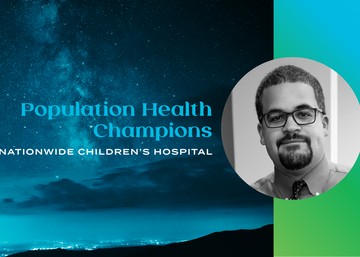

At Nationwide Children’s Hospital in Columbus, Ohio, population health isn’t a side initiative — it’s part of the system’s DNA. Their long-term strategy is rooted in action — and they take great pride in community partnership and putting in the work. They’re committed to rolling up their sleeves, investing in people and partnerships, and starting small — with purpose. Their goal isn’t just better healthcare, but better health for children today and generations to come.
We spoke with Nick Jones, Vice President of Community Wellness, to learn how Nationwide Children’s is building one of the country’s most comprehensive, community-rooted population health initiatives. From housing and education to workforce development and other upstream interventions, Nick shared powerful lessons on what it takes to create impact that is scalable, measurable and sustainable.
“You have to build in layers within the community.”Nick Jones - Vice President of Community Wellness, Nationwide Children's Hospital
Start with stability: a layered approach to community health
If you ask Nick which social determinant he worries about most, he won’t hesitate — it’s housing.
“We’re not just facing an affordable housing crisis — we’re facing a housing crisis, period,” he says. And he added, “we know that tangibly, it can have some of the biggest effects [on health outcomes].”
Nationwide Children’s three-pronged approach includes rental support, homeownership pathways, and home repair grants for existing residents on fixed incomes. The goal is to keep families stable and in place, creating the foundation for other supports — like education, jobs and healthcare — to take root.
“You have to build in layers within the community,” Nick says. “Housing helps us layer in other initiatives — but only after we’re able to put someone in a stable, affordable home. Without that, nothing else works.”
Community partnership is the starting point
For Nick Jones and his team, effective population health doesn’t start with a charter or a policy — it starts with partnership. That means showing up with humility, listening first and letting the community lead the way.
“This can’t be top-down,” Nick says. “We can’t just come in and say, ‘Here’s the program we’re bringing — join us.’ The community has to shape the work. It has to be community-informed from the start.”
That principle has been central to the hospital’s work from the very beginning. When expanding into Columbus’ Linden neighborhood, for example, Nationwide Children’s didn’t bring a playbook. Instead, they aligned their efforts with the city’s resident-driven One Linden Plan, selecting only the priorities they were best equipped to support.
That kind of partnership works in Columbus in part because there’s a shared commitment to collaboration built into the community and is what locals call “The Columbus Way” — a civic culture that encourages public-private partnerships and shared ownership of progress. Through networks like the Columbus Partnership, Nationwide Children’s has been able to join forces with government, business and philanthropic leaders to scale impact in a way that’s both coordinated and community-backed.
“Without those private partnerships, we wouldn’t have been able to scale,” Nick says.
Scale with purpose for sustainable impact
For Nationwide Children’s, scaling is never about replication for replication’s sake. It’s about deepening impact where it’s needed — and only when the conditions are right.
“We started with just 10 homes in one census tract,” Nick says. “We didn’t launch everything at once. We listened, proved we could make a difference, then grew based on what the community needed next.”
That kind of growth is layered, responsive, and long-term. After stabilizing housing in their first target neighborhood, the team began hearing about new priorities from residents, including the need for mentorship, education support, and youth leadership development. That feedback led to initiatives such as a local leadership academy and an employee mentorship program aimed at reducing chronic absenteeism.
Another powerful example is the hospital’s Upward Bound Math and Science program — the only one of its kind hosted by a standalone hospital. The program is designed for high school students who will be the first in their families to attend college and offers immersive STEM learning experiences and paid hospital internships. It not only prepares students for careers, it changes the trajectory of their lives.
“One young man grew up just down the street from the hospital,” Nick says. “He went to South High, joined our program, became the first in his family to graduate from college, and now he’s back, working in our behavioral health unit. That’s the kind of change we’re trying to create.”
Impact is born from a culture of doers
When asked what makes this work sustainable, Nick points to leadership. Nationwide’s current CEO — formerly its CFO — was the architect of the hospital’s population health strategy. With financial acumen and a passion for the community, he helped structure the accountable care organization and housing subsidiary that power much of the impact today.
“His leadership allowed this work to not only exist, but sustain,” Nick says. “It’s embedded in our strategic plan, our culture, our hiring. It’s who we are.”
That humility runs deep. “We’re doers,” he adds. “We’re not here to pound our chests. We’re here to serve."
Measuring what matters — data and dignity
Like any hospital, Nationwide relies on data dashboards and outcome metrics. But when it comes to population health, numbers alone aren’t enough.
“Yes, we track things like infant mortality, high school graduation, kindergarten readiness,” Nick says. “But externally? The most powerful ROI is word of mouth. It’s a mom telling her neighbor, ‘They fixed my roof. They filled out the tax paperwork with me. And they treated me with dignity.’ That’s what matters.”
Lessons learned and advice to other organizations
Nick’s biggest advice: start small. Don’t try to launch a massive initiative on day one. Build trust, show value, then grow.
“It’s taken us 17 years to get here. You can’t microwave this kind of impact,” he says. “Perfect can’t be the enemy of good.”
He also stresses the importance of aligning internal motivation with community need.
“You’re not going to get to Healthy Neighborhoods Healthy Families overnight. But if you show up with humility and a willingness to do the work, you can make a difference.”
Beyond the office: a glimpse into Nick’s world
Outside of work, Nick is a family man who loves to cook (his award-winning chili is a must at the annual family vacation). He’s currently working his way through the collected works of James Baldwin — a gift from his mother — and finds deep resonance in Baldwin’s reflections on society, justice and generational progress.
“I can’t go to sleep at night if I’m not doing my part to create a better space for my son,” Nick says. “That’s what keeps me going.”
While Core Creative has not partnered with Nationwide Children’s Hospital, we are proud to share their story in our Population Health Champions series. Their experience and commitment to population health reflect the kind of leadership we believe moves communities forward.


